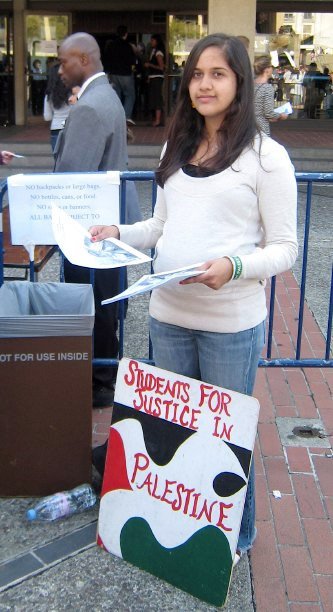
 Innovative Minds © 2014. All Rights Reserved. www.inminds.co.uk | ||||||
Singling out Israel is the right thing to doYaman Salahi Two weeks ago, UC Berkeley's student senate made a historic 16-4 decision to divest from General Electric and United Technologies, two American companies that profit from the Israeli occupation. A week later, the student body president vetoed the bill, citing its “focus on a specific country,” Israel. His veto echoed identical claims by Rabbi Abraham Cooper of the Simon Wiesenthal Center, that “in a world filled with human rights abuses across Africa, Asia and the Americas, the UC Berkeley students vote to single out Israel for censure is hypocritical.”  As the international movement calling for Palestinian freedom and urging boycott, divestment, and sanctions against Israel grows, this particular defense will likely become more pronounced. Thus, it merits a response so that its troubling implications for people who organize for justice and human rights can be cast aside once and for all. So: what does it mean to "single out Israel," and is it really “hypocritical” to do so? Under one meaning, it is unclear how anyone could ever do, say, or think anything pertaining to Israel without necessarily "singling out" Israel. Anytime one talks about Israel one must, by definition, "single out" Israel -- whether cognitively or linguistically. In that sense, "singling out" means focusing in some way on its actions. For example, for decades the US Congress "singled out" Israel to receive the largest share of the United States' foreign aid budget, amounting over the past half-century to more than all aid to sub-Saharan Africa, Latin America, and the Caribbean combined. [1] Under another meaning, the critic might be claiming that divestment "singles out" Israel unfairly. In order to assess that claim, one must look at the merits of criticisms toward Israeli policy to see if they are fair. What are these criticisms? Namely, that Israel repeatedly engages in gross violations of human rights and international law. The evidence for such claims comes from sources as numerous, varied, and reputable as Amnesty International, Human Rights Watch, the International Committee on the Red Cross, the Palestinian Center for Human Rights, B'Tselem, the Israeli Committee Against House Demolitions, the Center for Arab Minority Rights in Israel, the United Nations Commissioner on Human Rights, Reporters Without Borders, the European Union, and finally, the United Nations General Assembly. In the face of such evidence, any claim that there is no basis on which to fairly "single out" Israel requires a remarkable amount of self-delusion or deliberate ignorance. Under a third meaning, the critic could be saying that "singling out" Israel for criticism is unfair because while Israel is under scrutiny, other human rights violators are off the hook. But is it really true that those who report on Israel never hold other violators to task for their actions? In addition to extensive documentation of Israeli human rights abuses, every single organization above, without exception, has also documented and investigated claims about other parties. Some even have reports about nearly every country in the world. These organizations are not above criticism or scrutiny, but they also do not have reputations for dishonesty. While these organizations are routinely cited when discussing human rights violations in Darfur, Tibet, Sri Lanka, Burma, Russia, and China, just to name a few – it is only their criticism of Israel that is deemed “unfair,” “biased,” or “one-sided.” Who, then, is “singling out” Israel, and why? There are certainly anti-Semites who criticize Israel because they are racist, but these marginal people simply do not characterize those organizations mentioned above, the Palestinian people, or those of us in the international movement to boycott Israel for its long-standing human rights abuses. Indeed, refusing to address fair claims because of the occasional unfair accuser removes the anti-Semites from the margins and sacrifices the entire system of rights and the majority who support it at their altar. Under a final meaning, the critic could be claiming that "singling out" Israel for divestment is unfair, because divestment does not target every other country that also violates human rights. This argument is disingenuous. On its face, it appears to advocate for greater action on more human rights issues. In practice, however, it is deployed in order to silence those who would call for greater action in the face of Israeli war crimes and other violations of Palestinian rights under international law. Indeed, many of those who argue that divestment “singles out” Israel have no similar reservations when applying economic and political pressure to other countries and conflicts, such as Darfur. As Naomi Klein has written[2], divestment is not a dogma: it's a tactic. Up against powerful state and corporate actors, civil society must focus its energies for collective actions such as boycott or divestment to succeed. Such was the case when companies that enabled the South African apartheid regime were targeted for divestment. A similar campaign succeeded regarding Darfur, and today another campaign is underway against Sri Lanka for its continuing oppression of the Tamil people. In all three cases those nations were or are singled out for divestment while at the same time other injustices loomed in the world. To do so made tactical sense while re-inforcing the principle that companies are legitimate targets for boycott and divestment wherever they are integral actors in a system of oppression. When all other measures fail, consumers and investors have one last recourse: to chose to spend and invest their money elsewhere. For many around the world, this is the best way to intervene against Israel’s systematized racism and oppression of the Palestinian people. Those who believe that confronting Israel is unfair are themselves relying on an unacceptable double standard, "singling out" Israel, so to speak, as the one country expressly permitted to wantonly attack and persecute its minority citizens and subjects while the rest of the world passively watches. However, there can be only one universal standard of human rights. Privileging one state or actor over all others to remove it from accountability creates double standards that undermine the integrity of social justice activism all over the world. No one who chooses to engage in war crimes, colonization or human rights violations should expect the complicity of people around the world. Today, more than ever, is the time to single out Israel for criticism and boycott – not because it is the only purveyor of injustice in the world, or even necessarily the worst – but because no other international institution has succeeded in stopping the injustices against the Palestinians that continue to unfold before our eyes and in the full light of history.
[1]“In fact, from 1949 through 1997, the total of U.S. aid to all of the countries of sub-Saharan Africa and Latin America and the Caribbean combined was $64,127,500,000—considerably less than the $71,077,600,000 Israel received in the same 1949 through 1997 time period. According to the Population Reference Bureau of Washington, DC, in mid-1999 the sub-Saharan and Latin American and Caribbean countries have a combined population of 1.142 billion people, while Israel’s mid-1999 population is 6.1 million people.“ Washington Report on Middle East Affairs [2]http://www.thenation.com/doc/20090126/klein?rel=hp_currently Yaman Salahi, a UC Berkeley alumnus and member of Students for Justice in Palestine, is currently a student at Yale Law School.
Mobilize at UCB to overide the vetoIndymedia UC Berkeley ASUC President Will Smelko vetoed 'A Bill in Support of UC Divestment From War Crimes,' a bill which called on the ASUC and the UC to divest funds from companies enabling war crimes in the Occupied Palestinian Territories, and which was passed by the student senate in a 16 to 4 vote one week ago today. Many of you may be angry at the decision and its unprincipled rationale, as are we. Such a decision, however, does not change the fact that 16 out of 20 student representatives voted on the side of divestment, doing so after careful consideration of the facts and a 6 hour student debate with overflow capacity - a debate the ASUC President chose to miss while justifying his veto by claiming a lack of sufficient debate on the topic. If he had chosen to attend, he would have witnessed the broad-based coalition working to advance human rights in Israel/Palestine and social responsibility within our school's own investment portfolio. Now is a time to recognize that movement, a movement not just at UC Berkeley but at schools and institutions around the country and the world, and to redouble our efforts to end the Israeli occupation and reassert the need for an ethical investment policy. We must not let the Israel lobby prevail again. At UC Berkeley's campus, there will be a senate vote to override the President's veto, to be held in the following weeks. We expect to win this vote, as only 14 votes are needed to override a veto and already 16 senators have stood against war crimes, Israel's or otherwise. You can help prevent them from bowing to the pressure of the Israel lobby, which has been inaccurate in its characterization of this bill, in the following ways: 1) Come to the Senate Meeting and show your support as we vote to overrride the veto. If you would like to be a speaker that night, please contact us atucbdivest@gmail. com. We will be announcing date and other details at. http://calsjp . org. Bring your supportive friends and student group members. 2) Write personal or organizational emails to senators (to senate@asuc. org) when asked to do so in the weeks to come about why you support divestment as a tactic in general and in the case of Israel specifically. When sending emails, BCC ucbdivest@gmail. com. Beyond this, there is much to do in the broader public. This movement is not just about a victory for divestment at UC Berkeley. Rather it is more fundamentally about spreading divestment and the notion that sacred cows like Israel must be held to account for their gross violations of human rights, and that all people, Palestinians included, are deserving of basic human rights such as rights to life, property, freedom of movement, and a right to an education. Spread divestment to your church, your synagogue, your mosque, to other schools, to other institutions. And speak up in the press. Write a letter to the editor or an op-ed. Make the media know about the success at Berkeley and the successes to come. We know we are not alone and are grateful to the nearly 1,000 email messages sent to President Smelko urging him to sign the bill. Thank you so much for your solidarity. Keep your eyes peeled, will be in touch with next steps in the near future. Undaunted,
Open Letter to Berkeley Students on their Historic Israeli Divestment Bill – Naomi KleinNaomi Klein On March 18, continuing a long tradition of pioneering human rights campaigns, the Senate of the Associated Students of the University of California, Berkeley (ASUC) passed “A Bill In Support of UC DIVESTMENT FROM WAR CRIMES.” The historic bill resolves to divest ASUC’s assets from two American companies, General Electric and United Technologies, that are “materially and militarily supporting the Israeli government’s occupation of the Palestinian territories”-and to advocate that the UC, with about $135 million invested in companies that profit from Israel’s illegal actions in the Occupied Territories, follow suit. Although the bill passed by a vote of 16-4 after a packed and intense debate, the President of the Senate vetoed the bill six days later. The Senate is expected to reconsider the bill soon; groups such as Jewish Voice for Peace are asking supporters of the bill to send letters to the Senators, who can overturn the veto with only 14 votes. Here is the letter I just sent: Dear members of the ASUC Senate, I am writing to urge you to reaffirm Senate Bill 118A, despite the recent presidential veto. It comes as no surprise that you are under intense pressure to reverse your historic and democratic decision to divest from two companies that profit from Israel’s occupation of Palestinian territory. When a school with a deserved reputation for academic excellence and moral leadership takes such a bold position, it threatens to inspire others to take their own stands. Indeed, Berkeley–the campus and the wider community–has provided this kind of leadership on many key issues in the past: not only Apartheid in South Africa but also sweatshops in Indonesia, dictatorship in Burma, political killings in Nigeria, and the list goes on. Time and again, when the call for international solidarity has come from people denied a political voice, Berkeley has been among the first to answer. And in virtually every case, what began as a small action in a progressive community quickly spread across the country and around the world. Your recent divestment bill opposing Israeli war crimes stands to have this same kind of global impact, helping to build a grassroots, non-violent movement to end Israel’s violations of international law. And this is precisely what your opponents–by spreading deliberate lies about your actions–are desperately trying to prevent. They are even going so far as to claim that, in the future, there should be no divestment campaigns that target a specific country, a move that would rob activists of one of the most effective tools in the non-violent arsenal. Please don’t give into this pressure; too much is on the line. As the world has just witnessed with the Netanyahu government’s refusal to stop its illegal settlement expansion, political pressure is simply not enough to wrench Israel off its current disastrous path. And when our governments fail to apply sanctions for defiant illegality, other forms of pressure must come into play, including targeting those corporations that are profiting directly from human rights abuses. Whenever we take a political action, we open ourselves up to accusations of hypocrisy and double standards, since the truth is that we can never do enough in the face of pervasive global injustice. Yet to argue that taking a clear stand against Israeli war crimes is somehow to “discriminate unfairly” against Israelis and Jews (as the veto seems to claim) is to grossly pervert the language of human rights. Far from “singling out Israel,” with Senate Bill 118A, you are acting within Berkeley’s commendable and inspiring tradition. I understand that there is some debate about whether or not your divestment bill was adopted “in haste.” Not having been there, I cannot comment on your process, though I am deeply impressed by the careful research that went into the decision. I also know that in 2005 an extraordinarily broad range of Palestinian civil society groups called on activists around the world to adopt precisely these kinds of peaceful pressure tactics. In the years since that call, we have all watched as Israeli abuses have escalated dramatically: the attack on Lebanon in the summer of 2006, a massive expansion of illegal settlements and walls, an ongoing siege on Gaza that violates all prohibitions on collective punishment, and, worst of all, the 2008/9 attack on Gaza that left approximately 1,400 dead. I would humbly suggest that when it comes to acting to end Israeli war crimes, the international response has not suffered from too much haste but from far too little. This is a moment of great urgency, and the world is watching. Be brave. Yours sincerely,  Naomi Klein is an award-winning journalist and syndicated columnist and the author of the international and New York Times bestseller The Shock Doctrine: The Rise of Disaster Capitalism , now out in paperback. Her earlier books include the international best-seller, No Logo: Taking Aim at the Brand Bullies (which has just been re-published in a special10th Anniversary Edition ); and the collection Fences and Windows: Dispatches from the Front Lines of the Globalization Debate (2002). To read all her latest writing visitwww.naomiklein.org
Related ArticlesAlso Of InterestPage URL: http://www.inminds.co.uk/article.php?id=10352
|
|
Support Us
If you agree with our work then please support us.Campaigns INMINDS Facebook Live Feed Latest Video's
INMINDS Twitter Feed Tweets by @InmindsComFeatured Video's
You need Flash player 8+ and JavaScript enabled to view this video.
[all videos (over 200)..] Featured MP3 Podcast  "Everywhere we went (in Gaza) the same question was on every body's lips - 'You are here but where are the Arabs?' One little girl said to me 'where is this Arab world that they teach us about in school? Where is this Ummah that they talk to us about on Fridays? Why did they leave us alone?'. That's what she said to me, with tears in her eyes 'why did they leave us alone?' I had to turn my face away from her when she said it, and I'm not an Arab, I had to turn away.. I couldn't face her in the face of such a question.." Leader of Viva Palestina aid convoy to Gaza US tour hosted by Al-Awda, April 2009 [71min / 56Mb] [all podcasts..] Newsletter Feedback |
 |
 |


















































